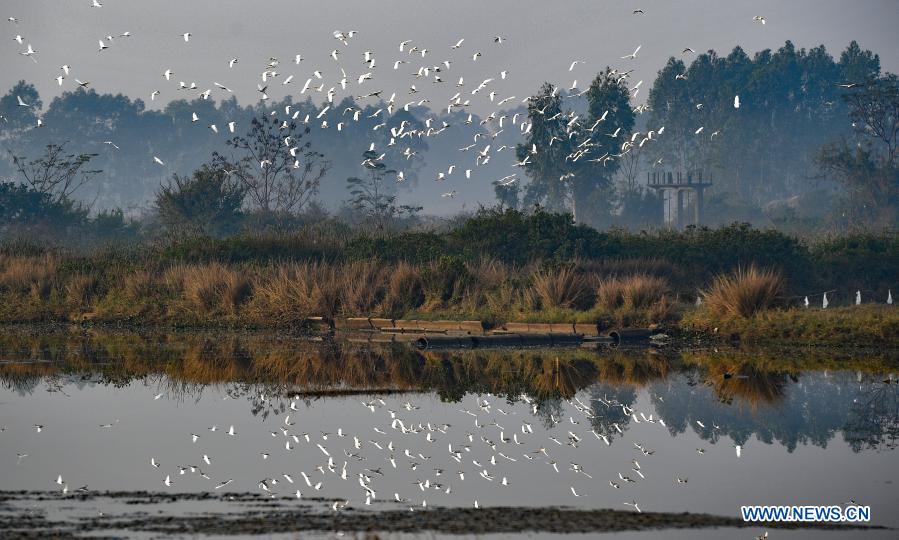China's contribution to wetlands conservation vital, says head of environmental treaty
China's contribution to the conservation of global wetlands and biodiversity is vital, said the head of an intergovernmental environmental treaty on Tuesday, urging the international community to strengthen efforts to save and restore the ecosystems crucial to human survival.
China's contribution to the conservation of global wetlands and biodiversity is vital, said the head of an intergovernmental environmental treaty on Tuesday, urging the international community to strengthen efforts to save and restore the ecosystems crucial to human survival.

A flock of herons fly in Panshan Village of Xinzhou Town in Danzhou City, south China's Hainan Province, Jan. 19, 2021. (Xinhua/Guo Cheng)
"China has been championing some very interesting initiatives domestically at the national level, with many activities going through the provincial levels to the cities," Martha Rojas Urrego, secretary general of the Ramsar Convention, told Xinhua on World Wetlands Day, which falls on Feb. 2 each year.
"There has been not only action but innovation," Rojas Urrego said.
The Ramsar Convention, also known as the Convention on Wetlands, was established in 1971 by the United Nations Educational, Scientific and Cultural Organization, and came into force in 1975. It provides for national action and international cooperation regarding the conservation of wetlands, and wise sustainable use of their resources.
Noting that China currently has 64 sites designated as "Wetlands of International Importance," which cover a surface area of 7.3 million hectares, Rojas Urrego said the Chinese government has been "very active in protecting and managing sustainably its important sites."
"It established a mechanism to identify and accredit cities that have a positive relationship with their wetlands," she noted.
China has also stepped up the legal protection of wetlands, she noted, adding that the Chinese government has "integrated wetlands into the way it manages other sectors."
"In particular, it has included wetlands as an indicator of governance performance," she said.
Apart from domestic initiatives, China has also organized several training workshops for different players from all over the region and world to strengthen their skills and capacities, she said.
The country has "played a very important role in terms of bringing examples and real-life solutions and ways of managing wetlands that have been useful and replicated in other places," she said.
Wuhan, the capital of central China's Hubei province, will host the 14th meeting of the Conference of the Contracting Parties to the Ramsar Convention this year, with Rojas Urrego calling it "a major contribution to come."
The event will be "a very important moment when all the parties get together, assess the progress, develop policies, and really push and get the necessary awareness and action to reverse the loss of wetlands," she said.
According to the Ramsar Convention, 64 percent of global wetlands have disappeared since 1900.
"Wetlands are the most threatened ecosystems. Definitely we need to do much more," said Rojas Urrego.
"We need to build on the very good experiences that we have, and then scale up, because so far the trends in terms of wetland loss around the world are very, very difficult," she added.

